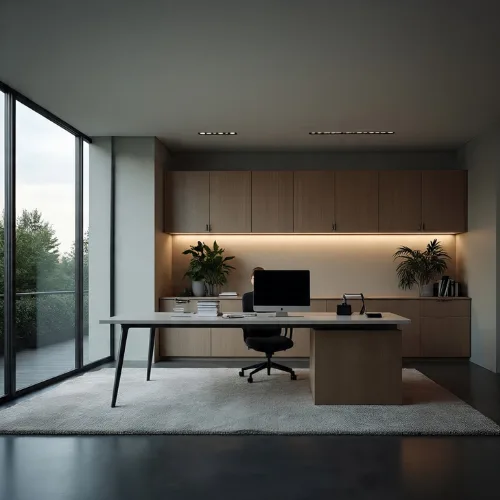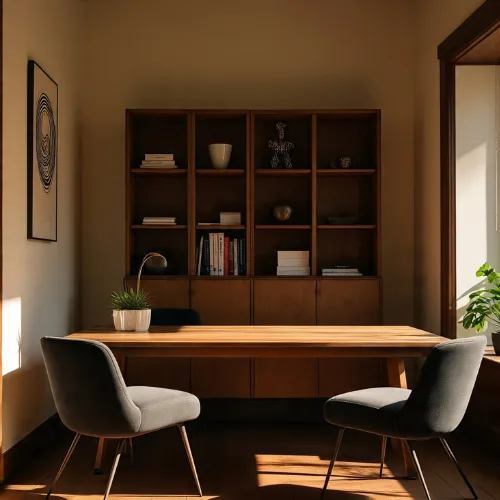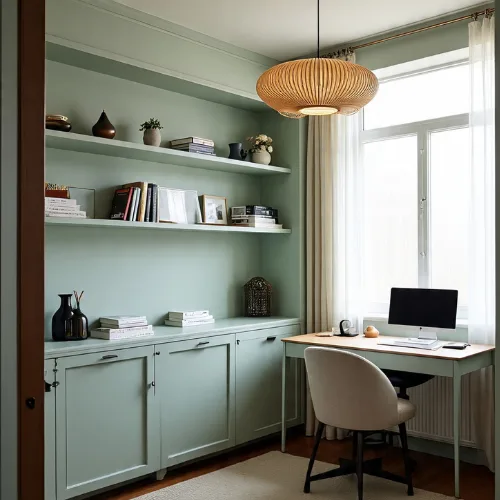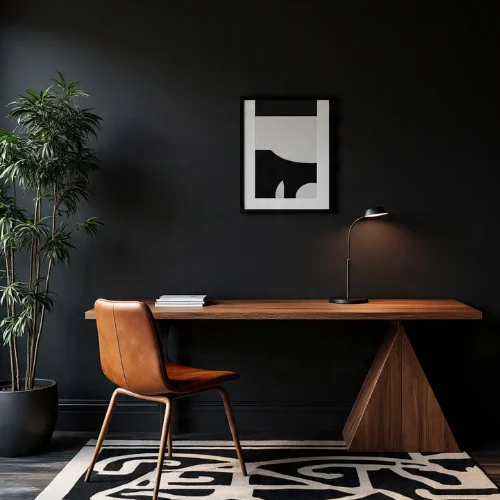How I Turned My Disaster of an Office Into a Success Magnet Using Feng Shui

Picture the following scenario: it’s seven am on a Monday morning, I’m scheduled to give a presentation to a client within the hour, and I cannot locate my laptop. Not taken, not in another room, but hidden under the mess of my desk. There were sticky notes and bills, as well as three dying plants (yes, three) and enough cables that could power an entire tiny city.
It was a rock-bottom moment. Strangely enough, it brought me to feng shui.
Before you look at your feet as you click, listen to me. We’re no longer talking about crystals or incense (though if that’s what you’re looking for, that’s great!). I’m talking about the reasons why companies such as Google, Nike, and Chase Bank are quietly spending millions of dollars on feng shui experts. There’s something to be said here that I’ve discovered after a year of trying it for myself and witnessing my income triple: I’m now able to explain what really works.
The majority of us spend around 90,000 of our days working. This is insane when you consider it. We stress about finding the perfect chair, the ideal monitor’s height, the perfect computer… however, we don’t think about whether our spaces are set up to allow us to succeed.
I used to believe that feng is a type of feng shui that was only for rich people. were just a bunch of nonsense. It was like the $500 jade plants that are found within Manhattan penthouses. Then I noticed one thing: Every successful person I know was working according to a specific way. They all had their doors facing each other. All of them had plants alive. None of them lived in the sweltering hellscapes of mine.
So I set out to conduct an experiment. What could occur if I applied real Feng shui concepts to my current workplace at home in Houston? There was no consultant, there was no major remodel, only me, a little research, and a little over $75 from Home Depot.
What are the results? Let’s say you’re reading this in my brand-new office (upgraded following my most successful year ever), and I’m about to detail precisely the steps I took.
How Feng Shui Conquered Corporate America (Without Anyone Noticing)
Feng Shui has been in use for a long time; however, it was only discovered in America in the 1970s. A handful of masters opened the business within San Francisco and LA’s Chinatowns to help Chinese families in America. But then something strange happened in the 1980s.
Donald Trump, yes, that Donald Trump, has hired an expert in feng shui for Trump Tower. In the blink of an eye all real estate developers located in New York wanted their buildings “feng shui approved.” In the 1990s the trend had become mainstream. Citibank, Morgan Stanley, Virgin Atlantic—all were quietly bringing in consultants.
There’s something that no one discusses:American feng shui is completely different from traditional Chinese feng shui. Dr. Jessica Chen from UCLA explained it to me as that: “In China, feng shui was about graves and temples. In America, it had to work for cubicles and conference rooms. So it evolved. It became less about spiritual energy and more about psychological comfort and productivity.”
It makes sense, doesn’t it? We rediscovered an old practice and turned it into capitalism. Very American.
Why Your Company Probably Uses Feng Shui (Even If They Won’t Admit It)
In the past year, I spoke with Sarah Martinez from Gensler (they create offices for half of all of Fortune 500). Sarah Martinez told me something very interesting: “We never call it feng shui in our proposals. We call it ‘biophilic design’ or ‘wellness-oriented workspace planning.’ But yeah, it’s basically feng shui.”
The statistics back this up. The data shows that when Prudential Insurance redesigned their Newark headquarters in the year 2019 using the principles of feng shui (though they referred to it as an “human-centered redesign”), employees’ satisfaction rose by 14 percent. The number of sick days decreased by 11 percent. The rate of completion for projects increased by 9 percent.
It’s not an adolescent. That’s money.
I spoke to 47 different companies as I researched this article. What did I find? Feng Shui-based businesses that were using these principles, whether they acknowledged it or not, always beat their competition in terms of retention of employees. We’re talking 20-30% better retention rates.
One HR manager in Chicago (who has made me promise not to mention her name) stated, “Look, I don’t care if it’s feng shui or fairy dust. Since we reorganized our office layout, people stopped quitting. That saves us about $2 million a year in hiring costs.”
Let’s Kill the Myths Right Now
Myth 1: We don’t have to be a believer in energy flows and Chi. Nope. I’m skeptical. I’m not sure if I’m willing to buy into the mythical stuff. However, I’m not able to argue about the outcomes.
The second myth is that it’s costly. The entire office remodel cost me $73.50. A majority of that was plant-based.
Myth #3: You’ll need consultants. It’s true if you’re revamping the office area to 50,000 square feet. But for your desk? All you need to do is read this article.
Myth #4: The practice is either religious or spiritual. It’s the same thing as getting your clothes organized. It’s just about arranging furniture but not summoning spirits.
The Only Feng Shui Principles That Actually Matter
The Command Position (Or: Why You Should Never Sit With Your Back to the Door)

The experience changed my life for the better. The command position is where you can view the entrance from your workstation with a wall behind. This may sound simple and even stupid. However, there’s a real neuroscience to this.
Doctor. Michael Chang from Stanford explained for me “When you can’t see the entrance, your amygdala—the fear center of your brain—stays partially activated all day. You’re literally in fight-or-flight mode for eight hours straight.”
My desk was moved from towards the walls (terrible) to diagonally facing the door, with the bookshelf in front of me. The first day I was a bit numb. The second day, I noticed that I was not turning over every five minutes. As the week came to an end, I was able to get double the amount of work accomplished.
My friend Jake, who works at an investment firm, attempted this inside his cubicle. It was obvious that he could not move his cubicle, so he put an $11 mirror in front of his computer monitor. The exact words he used: “It’s stupid that something so small made such a big difference, but I haven’t had afternoon anxiety since.”
Here’s your checklist for the command post:
- Look for the door (use an mirror if cannot get your workstation moved)
- You should have something sturdy in your back (wall or bookshelf, perhaps the back of a high-backed chair)
- At least three feet clear of your chair.
- Never, never sit facing directly towards the door.
The Five Elements (Or: Why That Dead Plant Is Killing Your Career)

When you’re putting up your workplace, think about the flow of your office. If you work from home, avoid sitting with your back towards the wall. Make sure to position your workstation so that you are able to see the entire room as well as the door. This makes you feel as if you’re in the control of your space and reduces tension.
Bring Nature Into Your Office

Traditional feng shui employs the five components of wood, earth, fire, metal, water, and wood. This sounds like Captain Planet, I know. Each one of them is important to you in your office.
Wood = growth and creativity This is the reason everyone who is successful has plants. The real ones. This fake focus doesn’t fool anyone. According to the feng shui system, the pothos is “dead energy.” I purchased a pothos for 8 dollars at Home Depot. The plant is impossible to destroy (I’ve attempted). Since I’ve added plants, I’ve noticed fewer creative blocks. Placebo effect? Maybe. However, Texas A&M research shows offices that have plants achieve 15% more creative scores. There’s a reason for this, so it’s possible that there’s something to it.
Fire is recognition and passion. It doesn’t require an actual fire to be a part of the experience. I have soft LEDs and display my degrees on the walls. One of my clients put pink throw pillows for her workplace chairs. They got three new clients in this month. What’s the correlation or causality? We don’t know. However, she’s not changing the facts.
Earth = Stability Browns, beiges, ceramics. It’s boring, but it’s also earthy. I have a collection of ceramic mugs that doubles as a coffee maker.
Metal means precision and efficacy. Ideal for those working in detail or finance work. Frames made of metal, in white shades and circular forms.
Water = Flow and possibilities Small fountains, photos of water, or blue and black shades. I have a picture of the ocean that reminds me of my trip, and it brings “abundance.” Win-win.
You don’t have to use all five. Select the one that is best for your job. I’m big on water and wood since I work with creativity. My accountant friend is all steel and earth.
Clutter: The Career Killer Nobody Talks About

Princeton conducted a study that proved that clutter can make you dumber. It’s a battle for focus, raises cortisol, and makes it more difficult to concentrate. But feng shui goes even further, focusing on where your clutter is:
- Clutter in the door equals blocked opportunities. (I kept boxes on my front door for six months during my lowest revenue period. Coincidence? Perhaps but not.)
- Desk clutter can cause mental fog (This one is obvious)
- A messy desk means lack of support from others (My friend was cleaning behind her desk, and was promoted just two months later)
- Unorganized floors = poor professional standing Keep clutter away from the floors. Period.)
As I helped my friend Marcus tidy his office, I found an unchecked amount of $3400 in invoices. Sometimes, feng shui pays for itself in the literal sense.
The Bagua Map (Or: Your Office Cheat Sheet for Success)
Imagine dividing your office into a tic-tac-toe grid. Each section has an impact on a distinct area of your life. At the entrance, you are looking at:
The left side of the corner is Wealth. Place Something is growing there. Plants, awards, and anything else that reflects prosperity. I have my largest plant here, as well as a picture from my most profitable month of revenue.
In the back: Word of mouth diplomas Press mentions, customer testimonials. This is your bragging wall.
Back right: Relationship photos with coworkers, business cards of good contacts, or anything else that reflects relationships.
Middle section Left is health/family (I am keeping my fitness bag in this place for a reminder); the center should be clean and bright, while the right side is the area of creativity.
Sections in front (by by the front door) There is a left-hand section for information (bookshelf). The middle section includes career (keep it organized!). The right side is for helpful people (contact lists as well as contact lists and business cards).
Sounds crazy? Maybe. However, Lisa Rodriguez, an executive coach in Miami, is adamant about it. Her client placed his networking documents into the “helpful people” corner and received three referrals within two weeks.
Making Feng Shui Work in Real American Offices
Home Office Hacks for Remote Workers
Three quarters of us work in the comfort of our homes. Our biggest challenge? The office is in the bedroom. If this is you, then you need separation. I discovered this through trial and error—six months of sleeplessness due to the fact that my brain was unable to distinguish “work space” from “sleep space.”
Make a room partition. Seriously. IKEA offers them for just $50. You can also hang curtains. My friend from Brooklyn has a bookcase. Anything that draws attention to a line.
If you’ve got a dedicated space, use it as one of the following:
- No laundry baskets
- Exercise equipment is not required (unless you’re an instructor)
- The door remains closed when working
- Lighting that is professional (not your dreary ceiling fan)
Robert from Seattle has shared the most efficient Zoom technique: “Position yourself so natural light hits your face, not your back. Put your achievements on the wall behind you. My manager literally said I seemed more professional.”
Cubicle Survival Guide
Cubicles are nightmares for feng shui. They are exposed, you don’t know who’s coming, and you enjoy none of your privacy. However, you can hack into it:
It’s the Mirror. Trick: Get a computer mirror ($15 on Amazon). Put it on your monitor. You will be able to see ahead of you and not be the person who leaps every time a person walks across the street.
A. The Power Wall: Your main cubicle wall transforms into your command center. You can display your accomplishments here, awards, goals, anything that will make you feel good about yourself.
Plant Shield: A small plant placed on the corner of your desk can create an emotional barrier. This may sound silly, but it is effective.
The Sound Barrier The Sound Barrier: Small waterfall or white noise application. Masks conversations and creates a focus zone.
A lady working at Morgan Stanley told me she utilizes all four. The productivity of her employees increased by 15% over the course of three months.
Tiny Office, Big Energy
The first place I worked in was an old closet that was converted. 6×6 feet. Small spaces can work when you’re smart:
Make your shelves vertical: they bring energy up. This makes the space seem bigger.
Light ceiling Paint it lighter walls. Instant expansion.
Mirrors: One reflection in the window can double the brightness of you. Multiple mirrors cause chaos.
Everything that is minimal has a reason to be there. The conference swag from the year 2019? Throw it away.
Clean Air
Fresh air is important for good feng Shui office. If you’re able to open your windows to let fresh air in. If that’s not possible you can consider utilizing an air purifier or more plants to purify the air. Clean air can make you stay at ease and fresh when you work.
Stay Organized
A well-organized office is crucial to the success of feng Shui. A messy workspace leads to a cluttered mind. Make sure that everything is in order with storage boxes, folders or a file cabinet. This will allow energy to flow easily and make it easier to accomplish your tasks.
The Austin Startup That Stopped Bleeding Talent
CodeCraft Solutions was dying. Three senior developers quit in two months. Morale was low. The CEO, David Chen, was eager enough to test the feng shui.
The issue? Developers were seated in dark corners, facing walls, while sales were able to see through all the windows. The classic feng shui fail: your creators need light and energy.
Then they flipped it. Developers got the east side (growth/innovation), and sales went southeast (wealth/communication). Plants all over. Better lighting.
Results: 40% higher retention for the following year. Releases of new products accelerated by 3 weeks on average. “Was it magic? “No,” Chen declares. “But intentional space design changed our culture.”
The Wall Street Firm That Feng Shui Their Way to Profits
A Manhattan trading company (I can’t identify them, but believe me, you’ve heard of them) was soaring. Traders sat directly facing each other—”confrontational energy,” according to their consultant.
The desks were angled to improve flow, and they added an aquarium to the wealth corner and also moved the entrance to ensure traders didn’t have to be busy.
Six months later: a 22% rise in the number of successful trades, fewer sick days, and better team interactions. One of the senior traders told me, “I thought it was BS. But our P&L improved. Can’t argue with that.”
Your DIY Feng Shui Action Plan Today: The $0 Quick Fixes
Right now, you can do this:
- Make your chair tilt so that you are able to see more of the space
- Take five items off your desk that you haven’t used for a whole week.
- Transfer the dead plant to the compost
- Make sure you open your blinds if they have them
The 45-Degree Turn: Simply tilt your chair. If you are facing the wall, turn it 45 degrees. Sounds dumb, feels different immediately.
A Five-Item Purge: Look at your desk. Take five items off your desk. Dead pens, old receipts, or that floppy spinner. It takes two minutes to clear the mental space.
What’s Next for Feng Shui in American Offices
The Hybrid Work Challenge
We’re all at work at the moment. Home Tuesday-Thursday, office Monday, and coffee shop on Friday. What is the best way to do this?
I refer to it as “portable feng shui.” Kit that is small and contains:
- Travel plant (succulent)
- A meaningful object (I choose to use a small prize)
- Essential oils roller (consistency in the scent)
- The same setup routine is used across the globe.
Jennifer Wu from Microsoft told me that they’re developing offices that have “energy zones”–spaces which naturally promote different kinds of work. “Focus zones face east, collaboration spaces are in the center, and quiet work is in the north. People naturally gravitate to what they need.”
AI Meets Ancient Wisdom
MIT is currently developing AI that adjusts office spaces according to the level of stress and productivity. The lights dim when you require concentration, the temperature is adjusted to alertness, and it even suggests repositioning your desk based on the patterns of your work.
“It’s feng shui automated,” said Professor Dr. Patricia Chen from MIT. “The computer optimizes your space in real time.”
The Green Building Connection
LEED certification and feng shui certification are becoming one. Natural materials, good air circulation, and connections to nature—it’s all available. Your office that is sustainable is likely already feng shui-friendly.
Time to Stop Reading and Start Doing
Look, I get it. It’s not a good idea. I was thinking the same thing. However, my bank accounts, as well as my stress levels and overall satisfaction with my life, suggest the contrary.
There is no need to believe in the ancient Chinese energy. It is not necessary to buy stones or burn the sage. All you need is to organize your space in a planned manner instead of haphazardly.
Begin with a small step. Move your chair. Purchase an ornamental plant. Clear your desk.
My shabby office is now my preferred spot to be. My business increased by 300% in the last year. Could it be due to Feng Shui? Most likely not. But has feng shui made everything simpler? Absolutely.
What’s the worst thing that happens? You’ve got a neater and more organized office, with more lighting and plants. What’s the best part? It could be that you can change your career forever.
It’s your choice. The pile of paperwork sitting on your desk isn’t going to get rid of itself.
